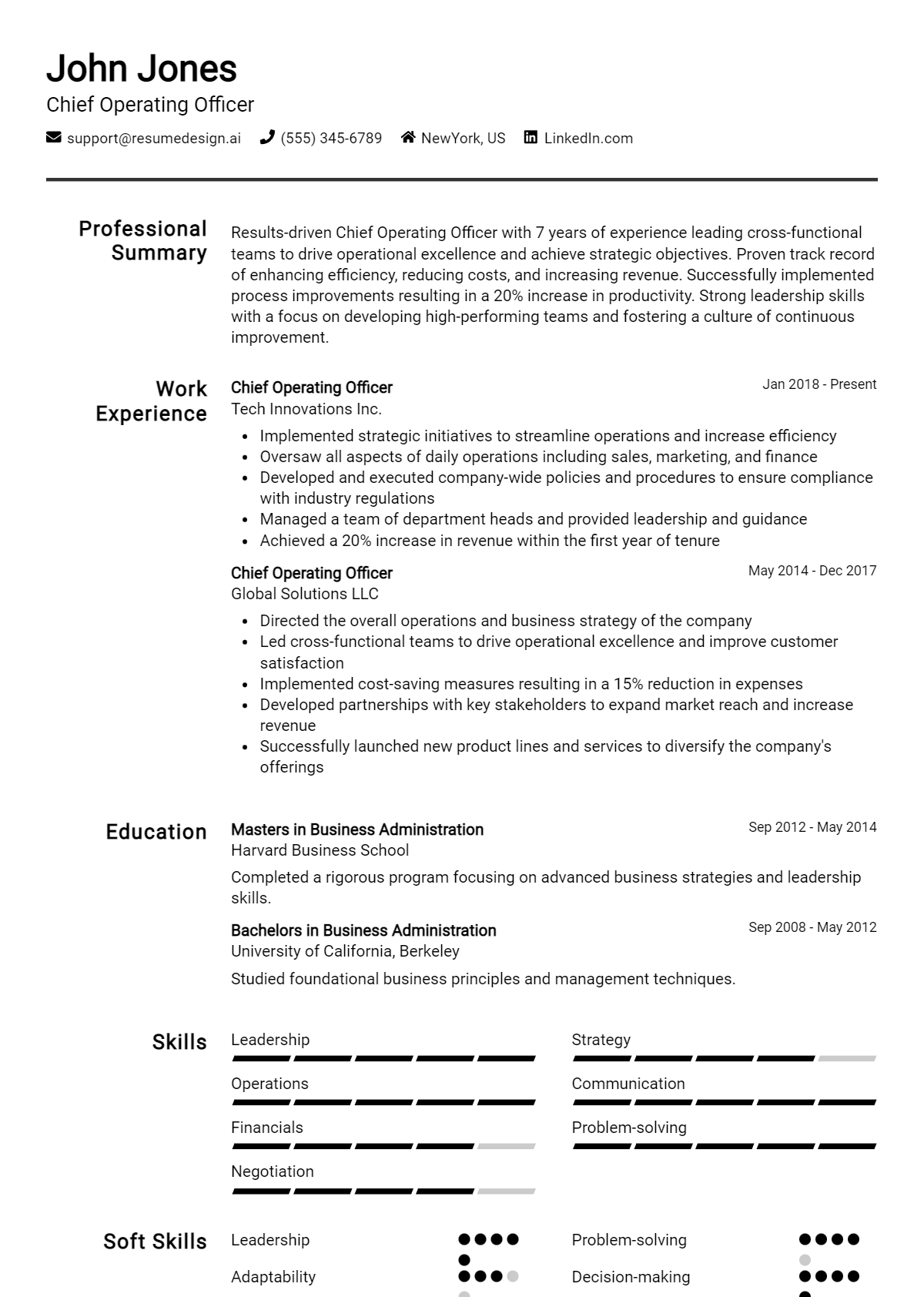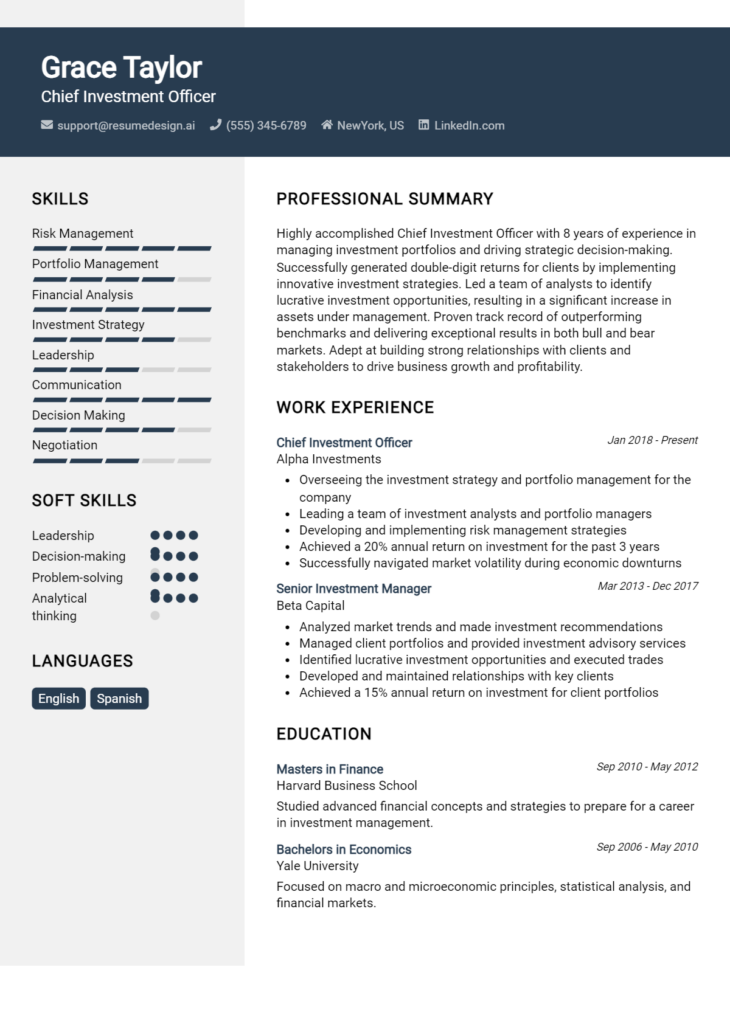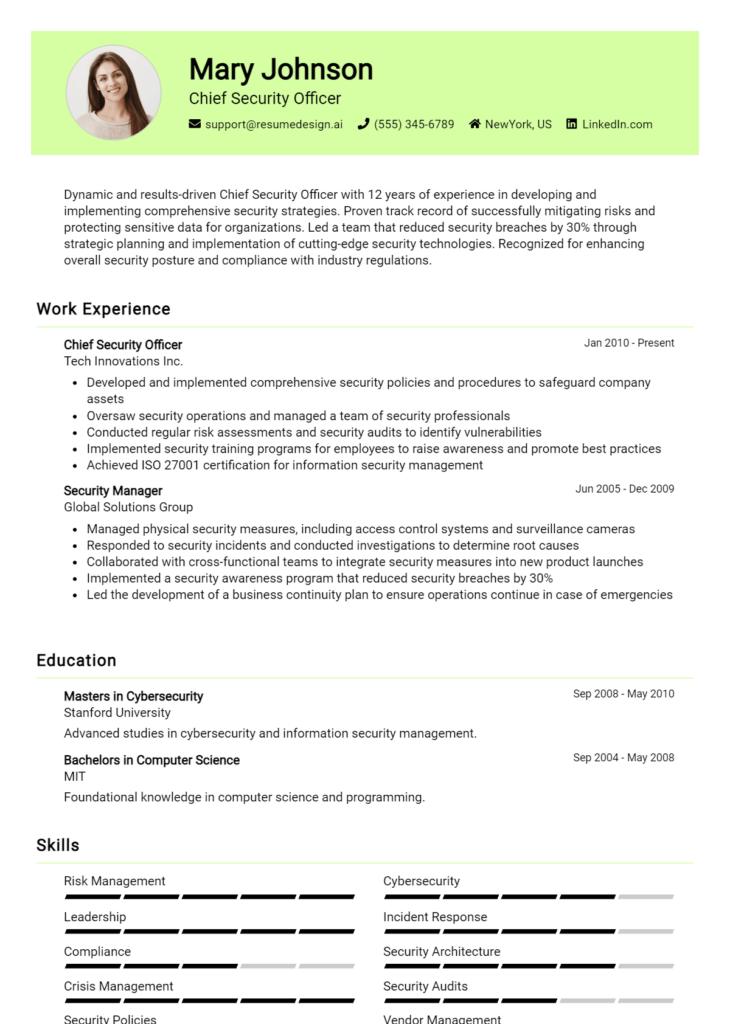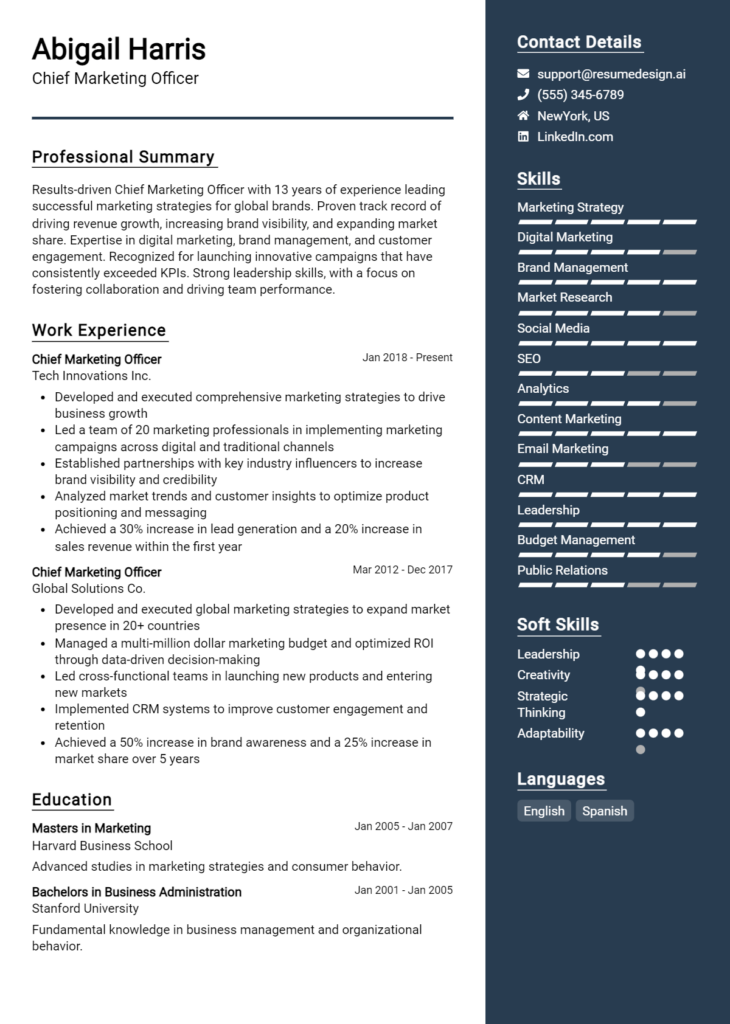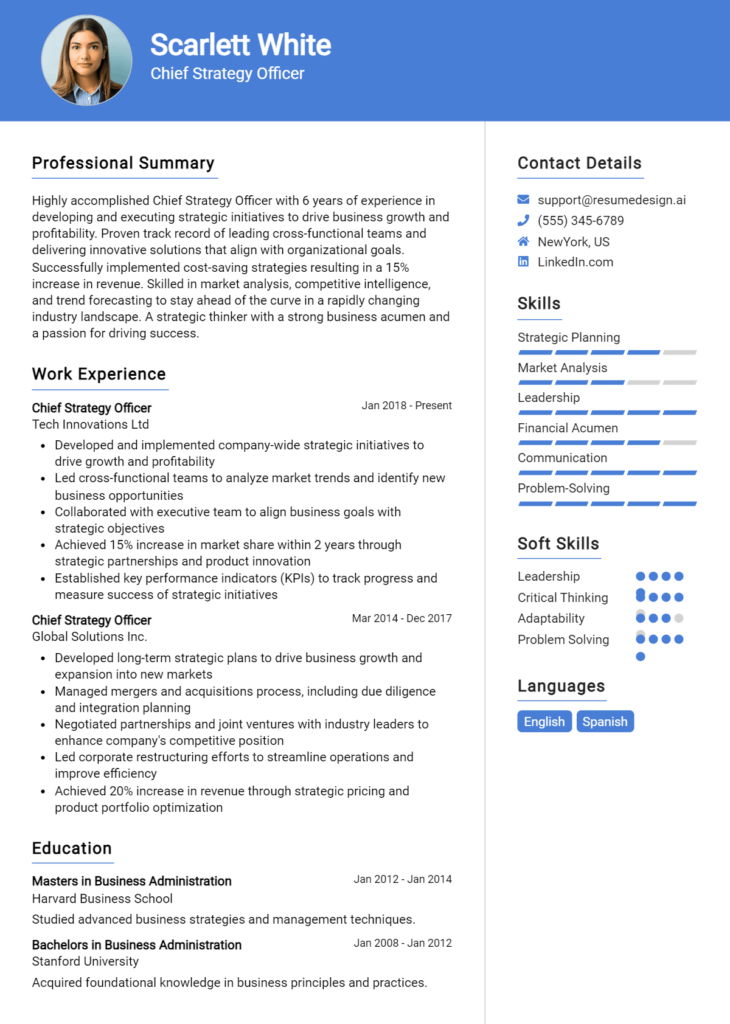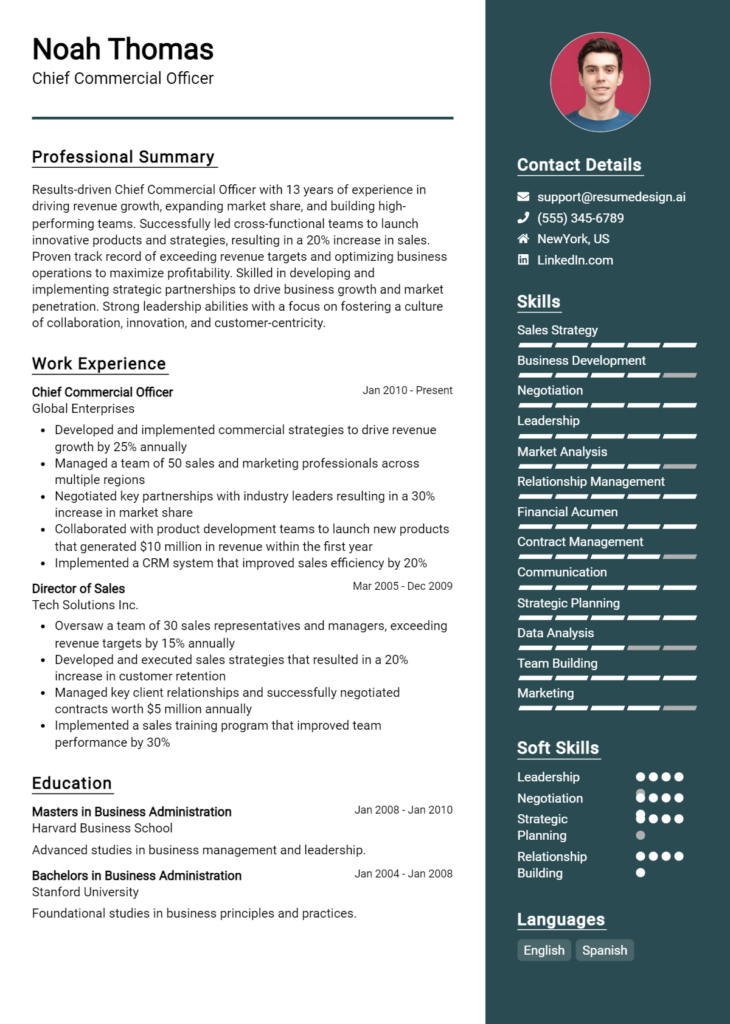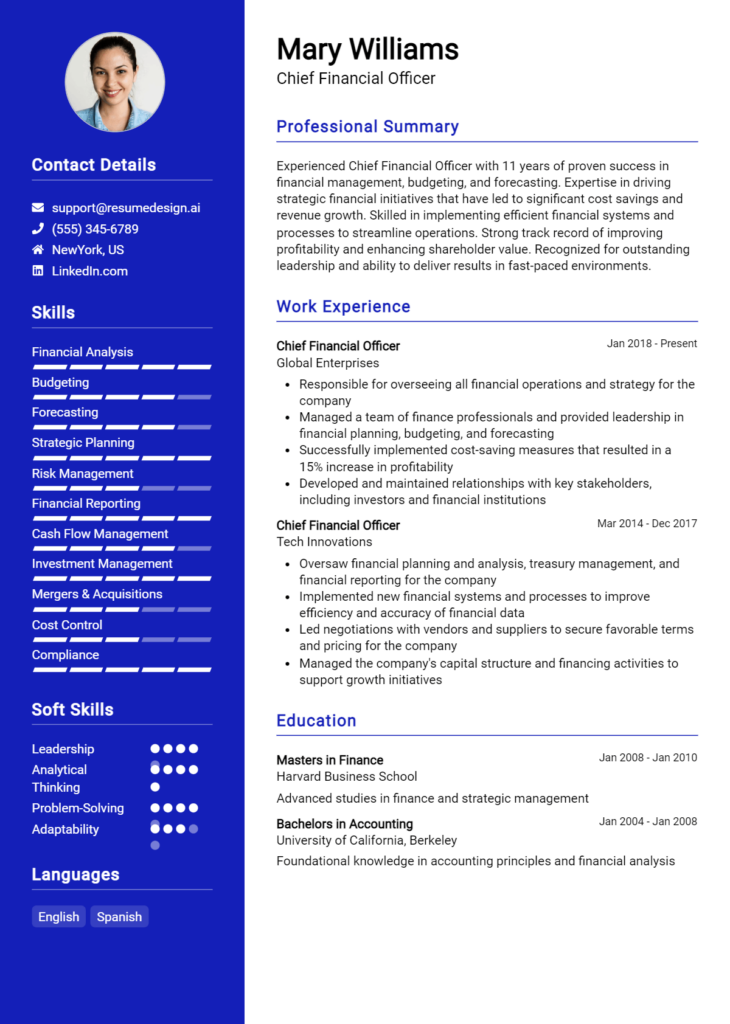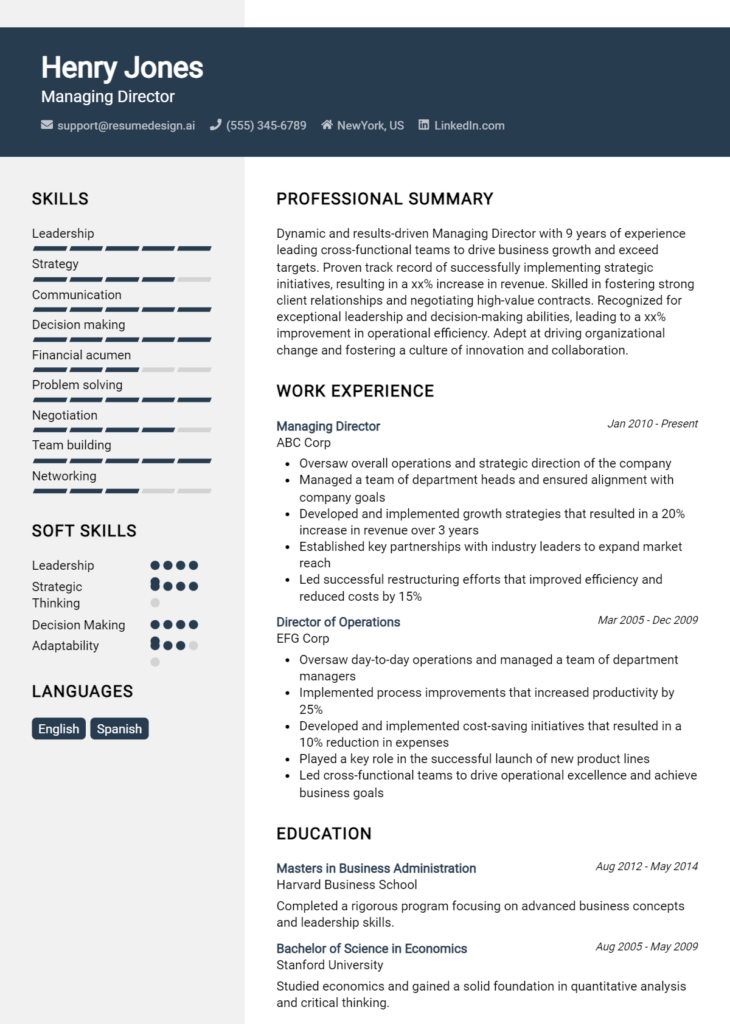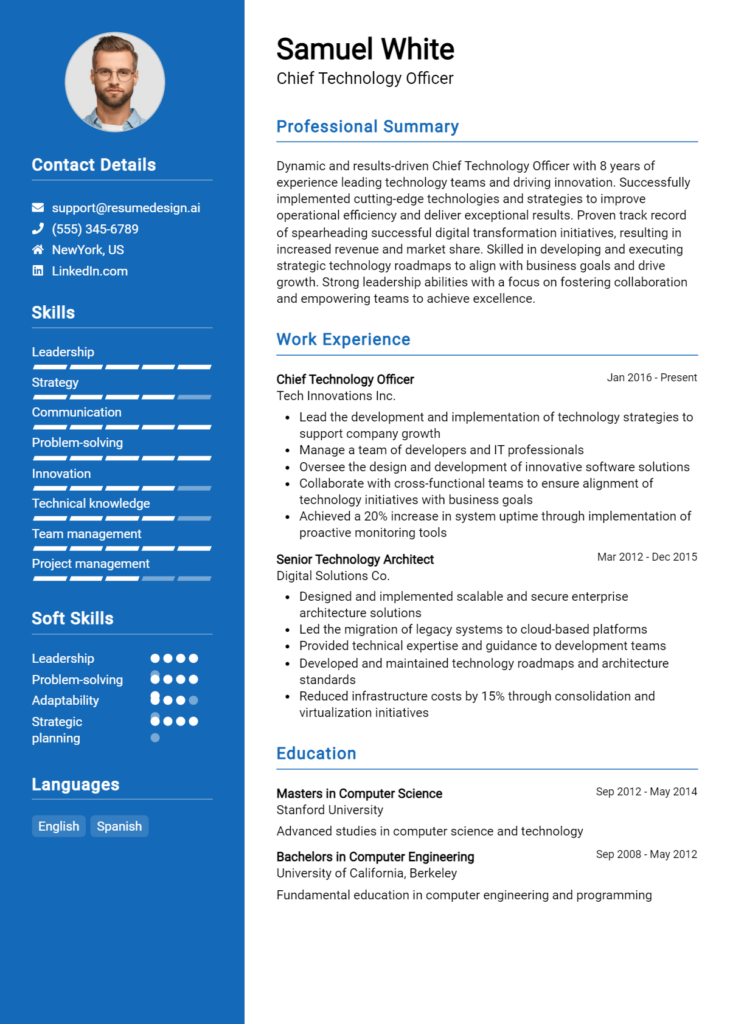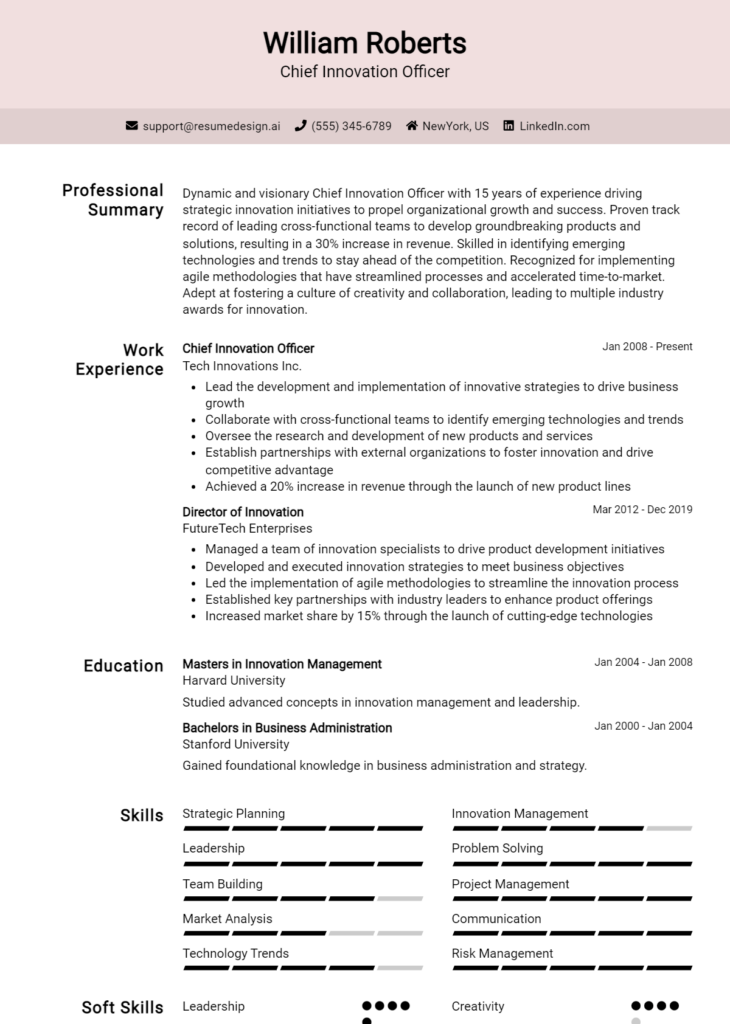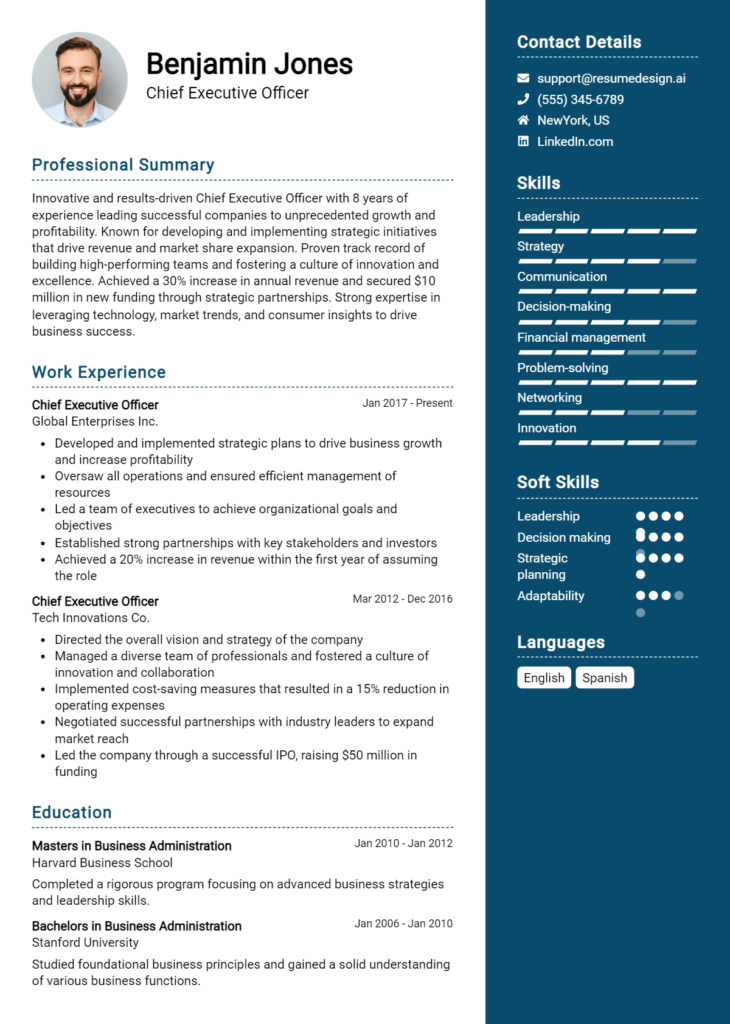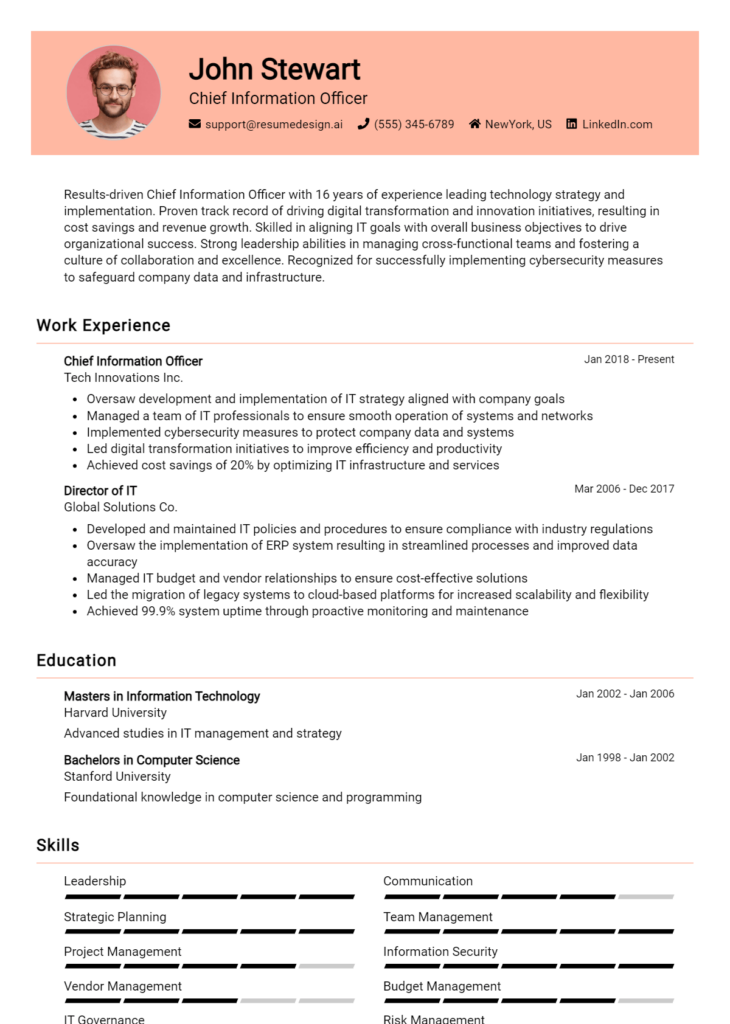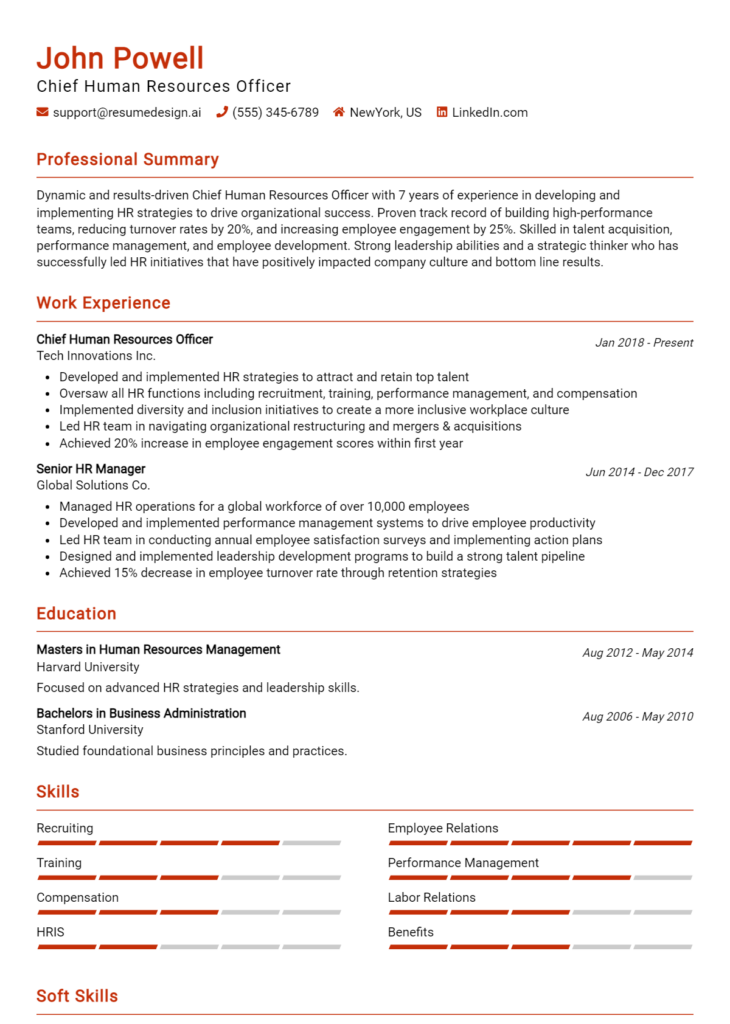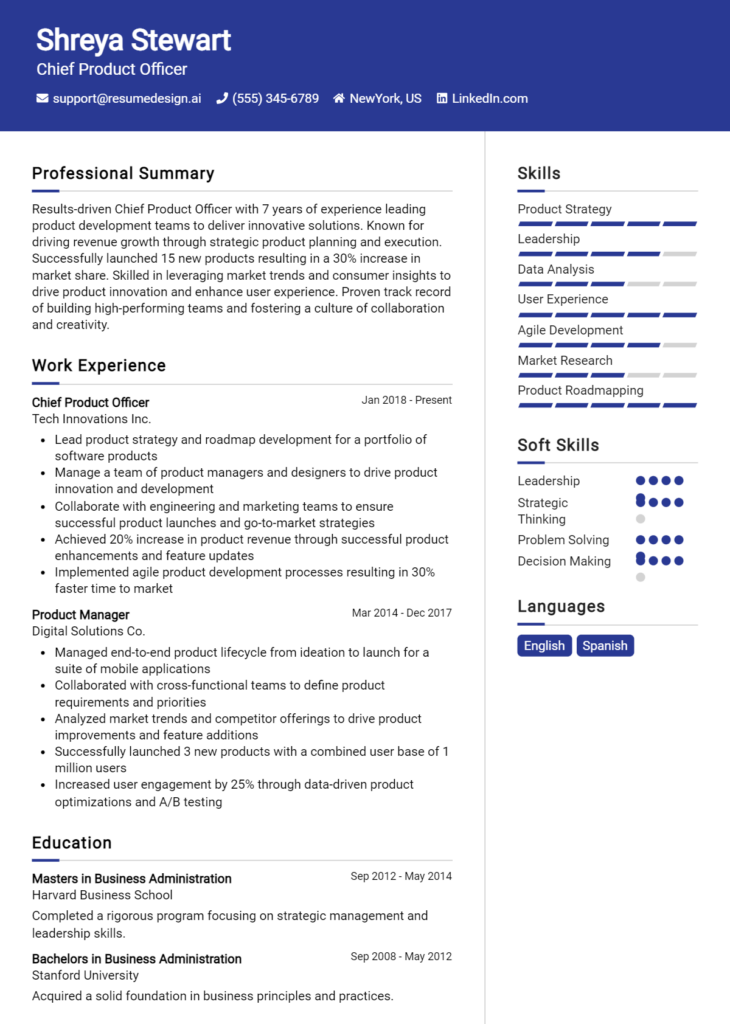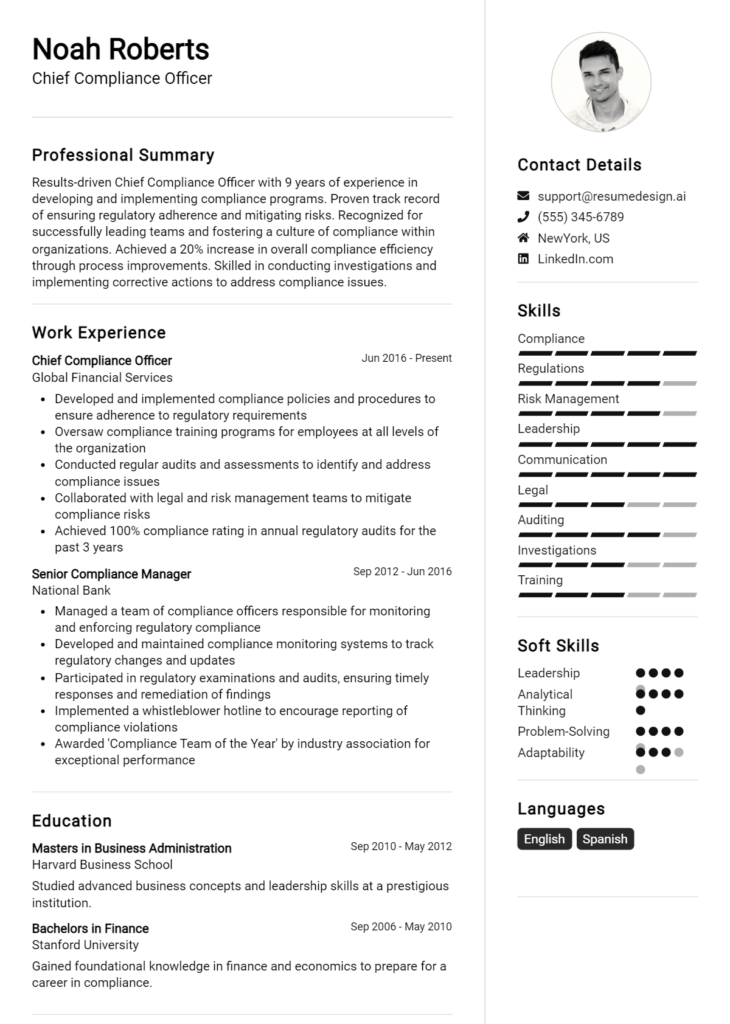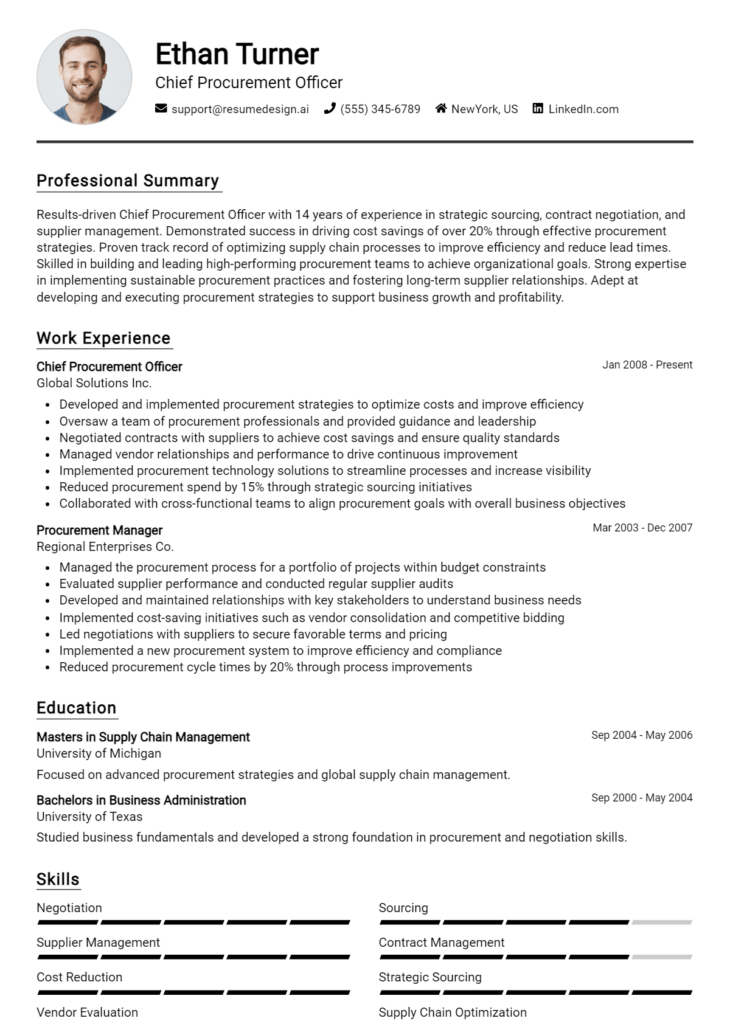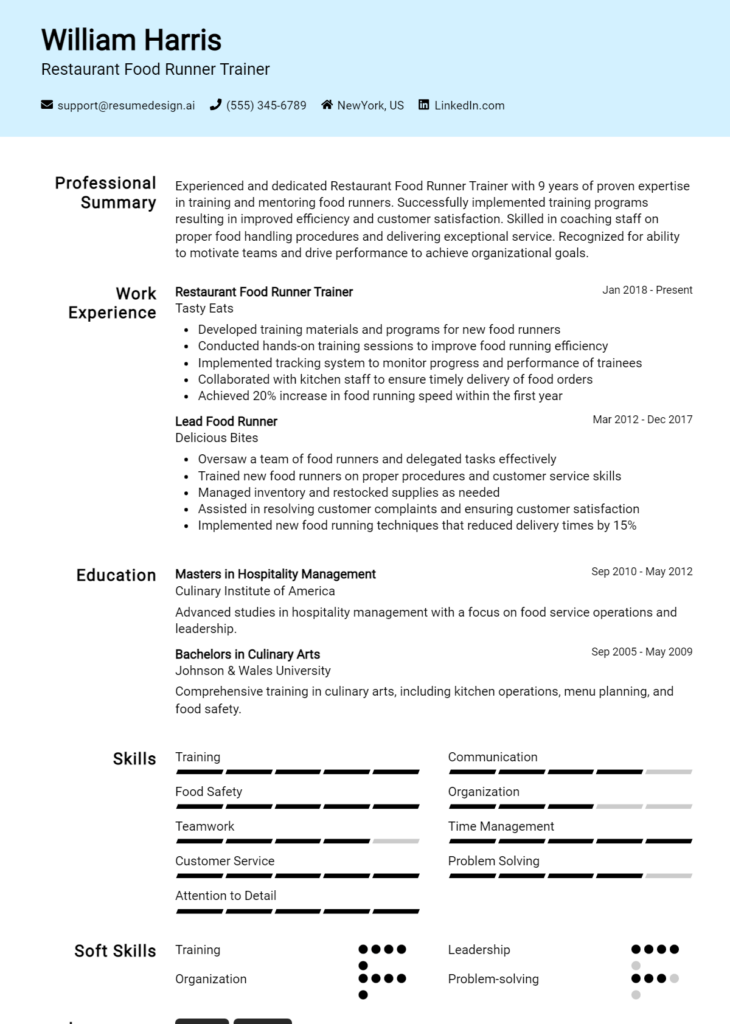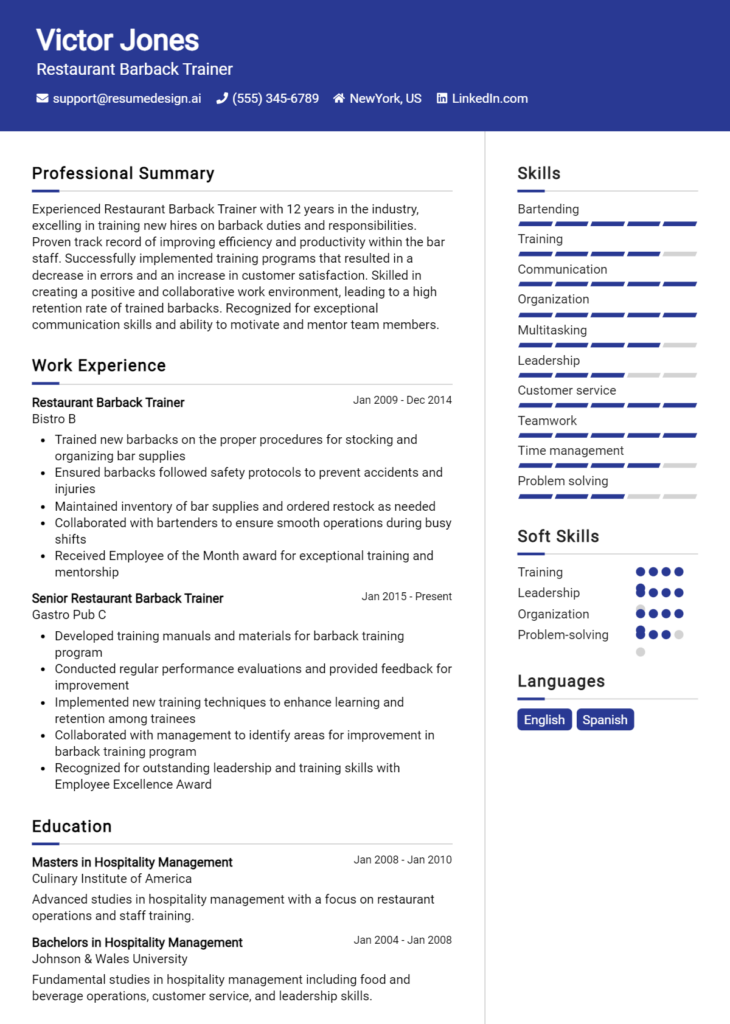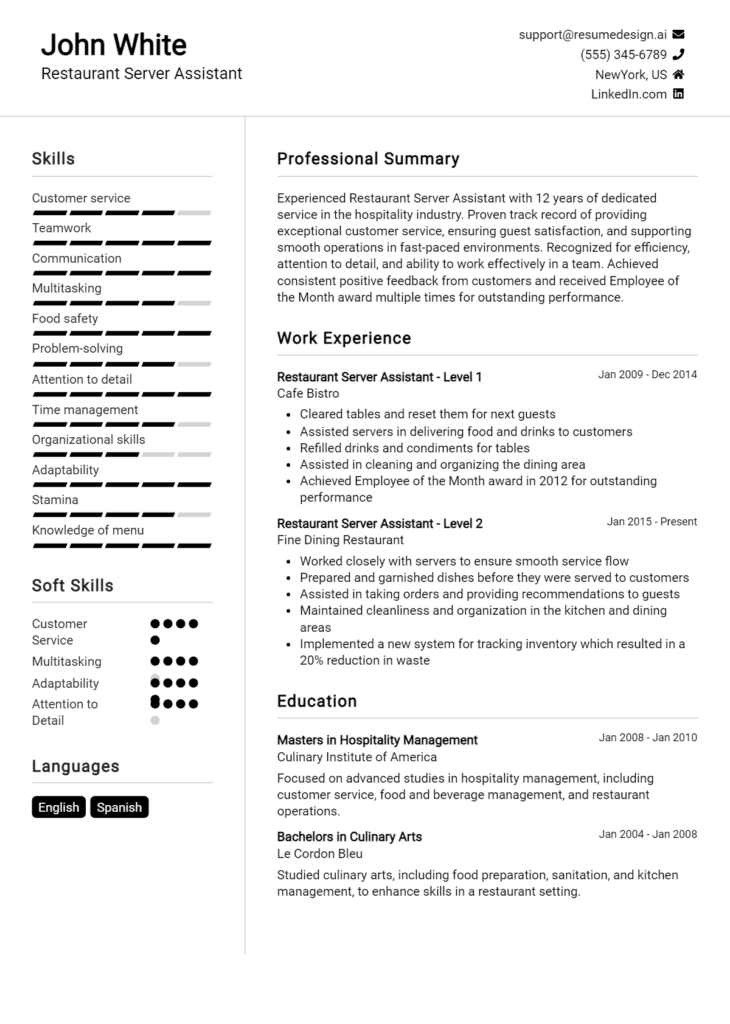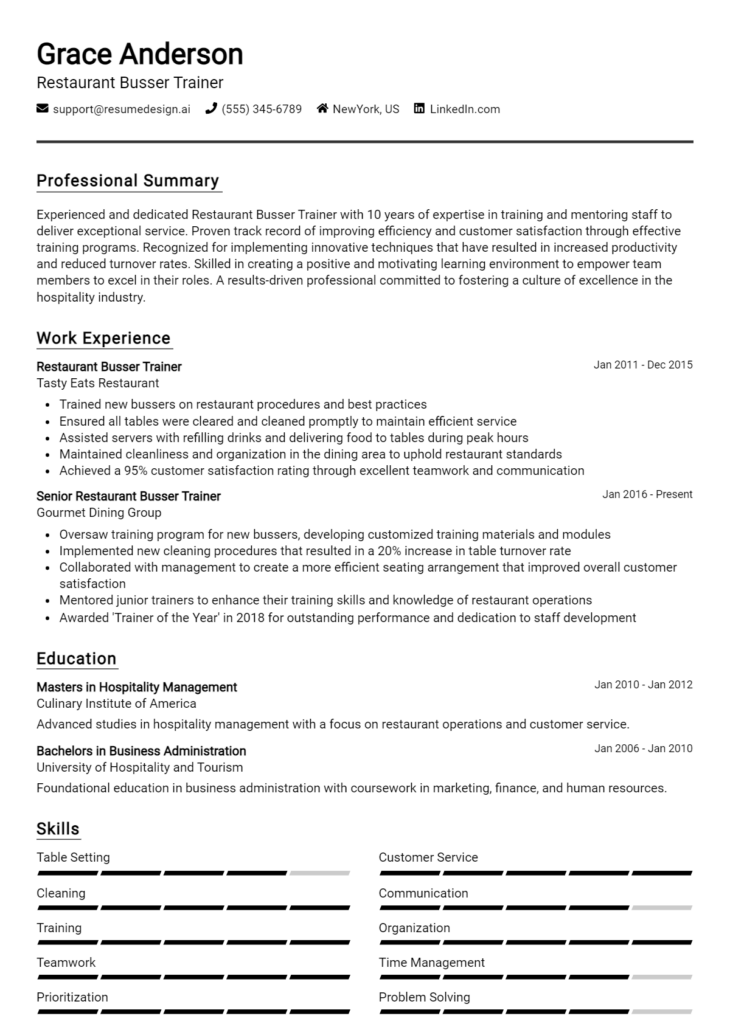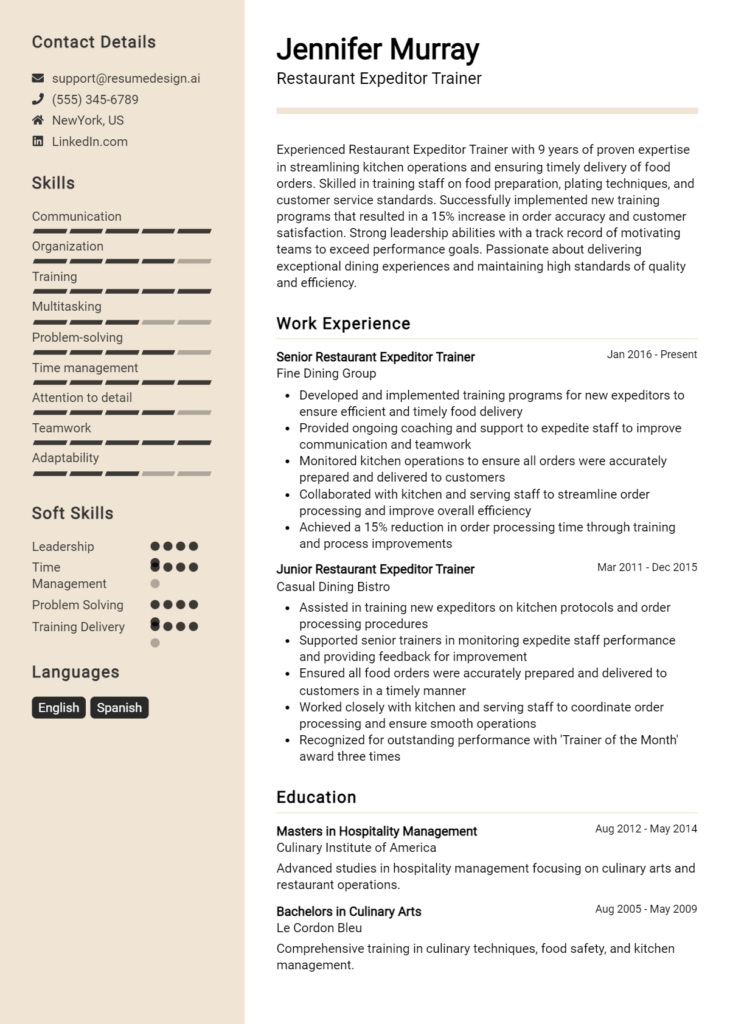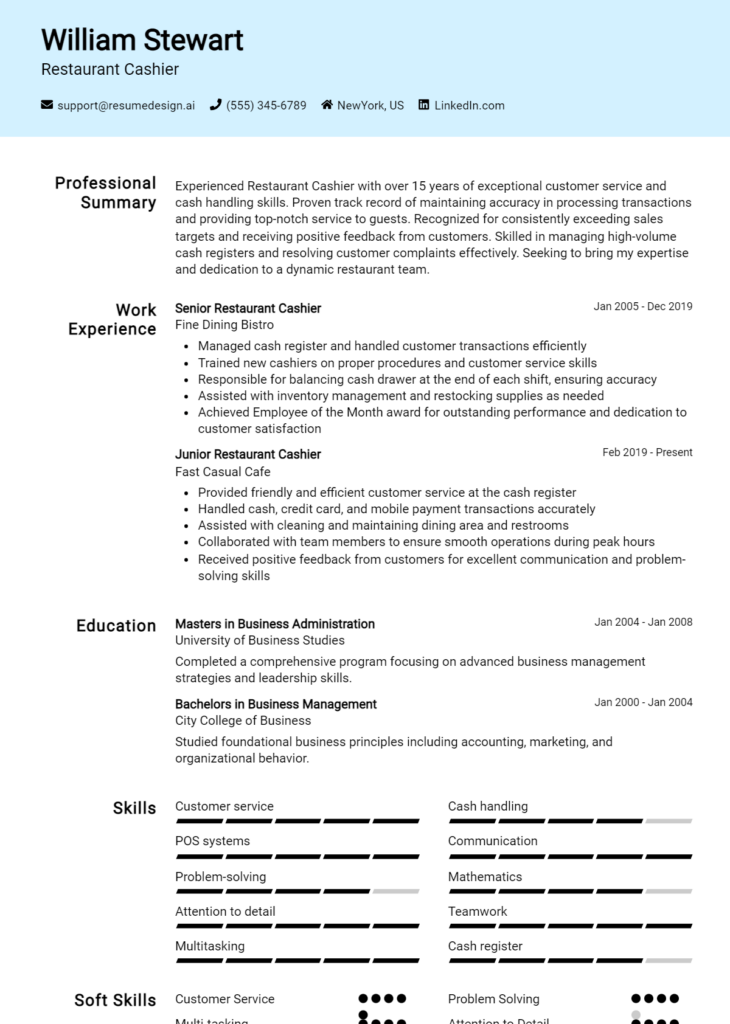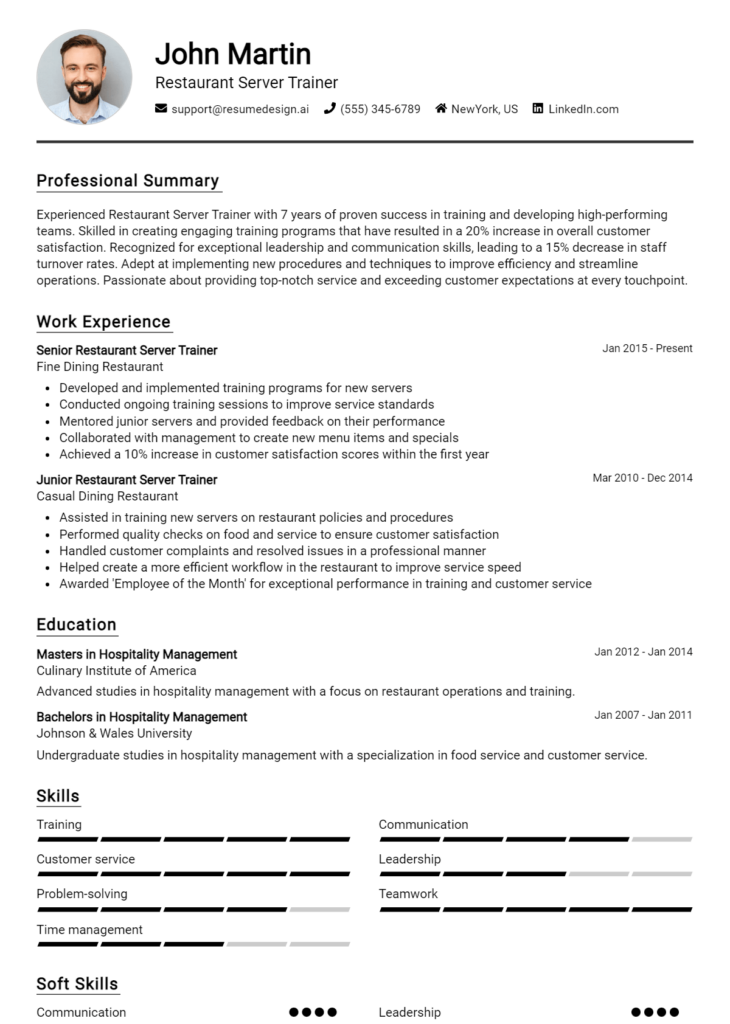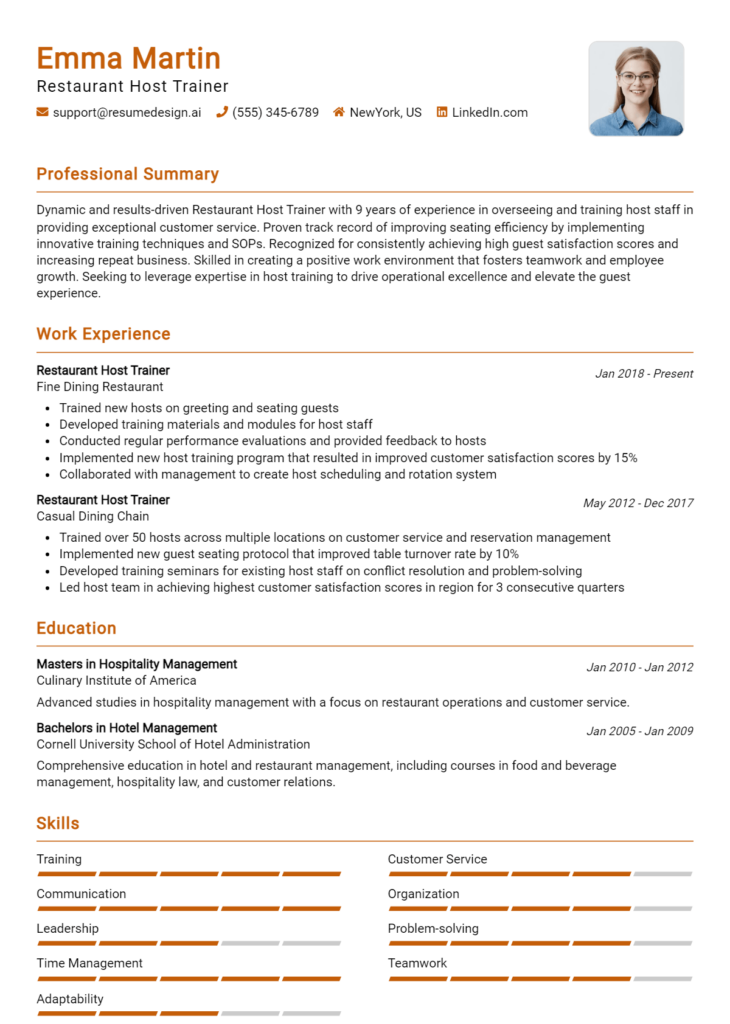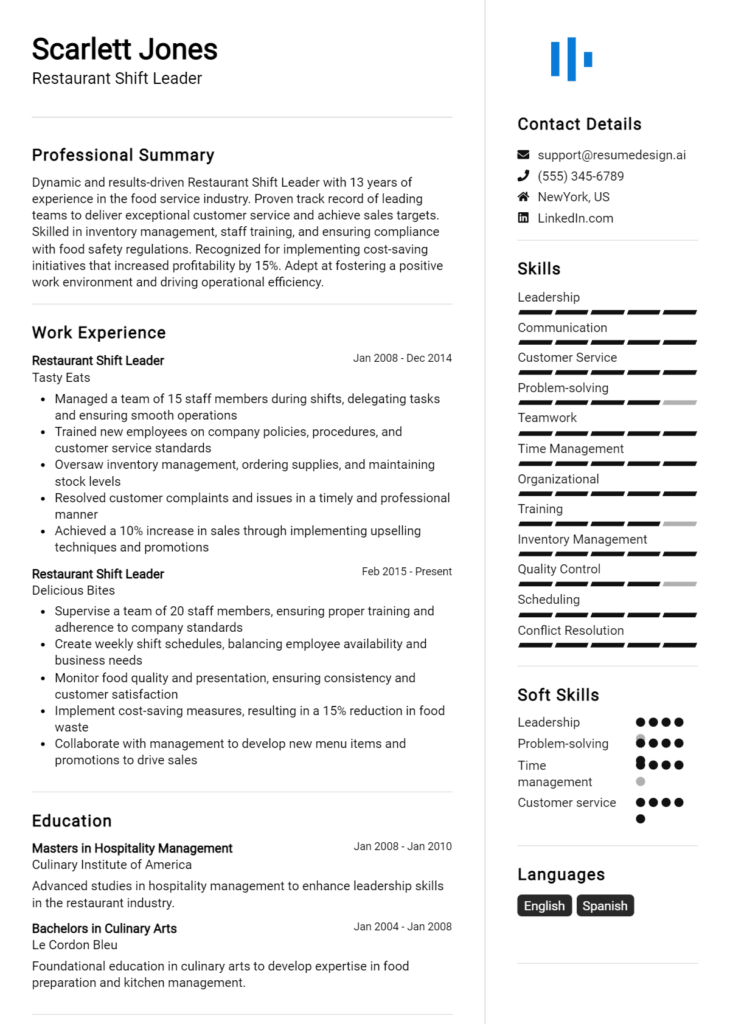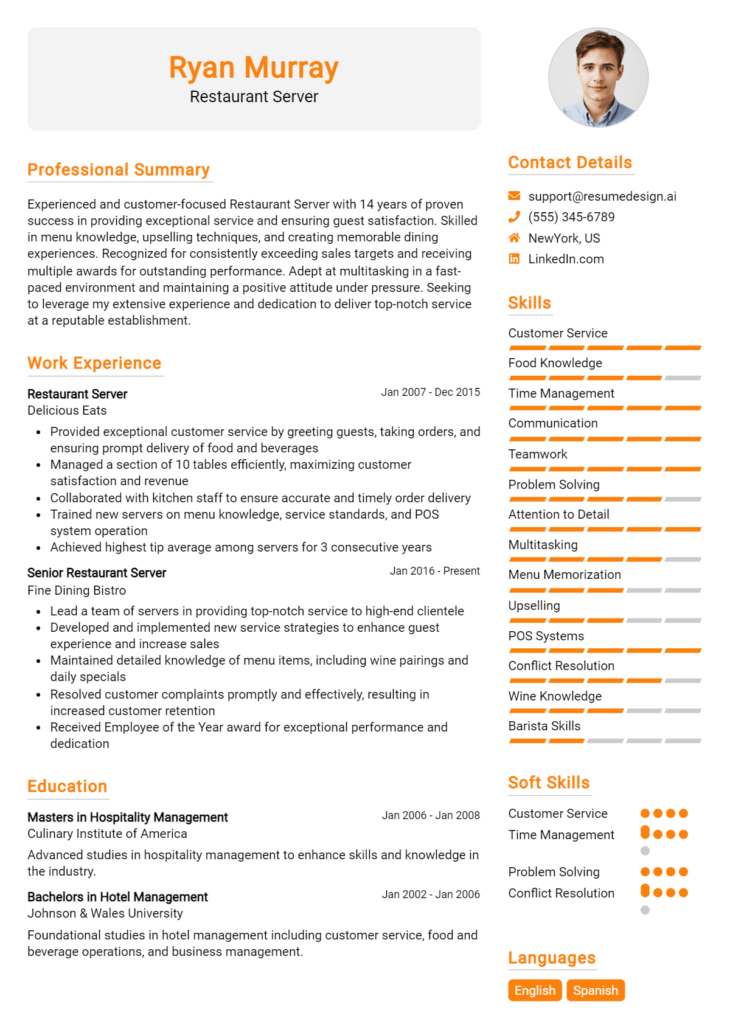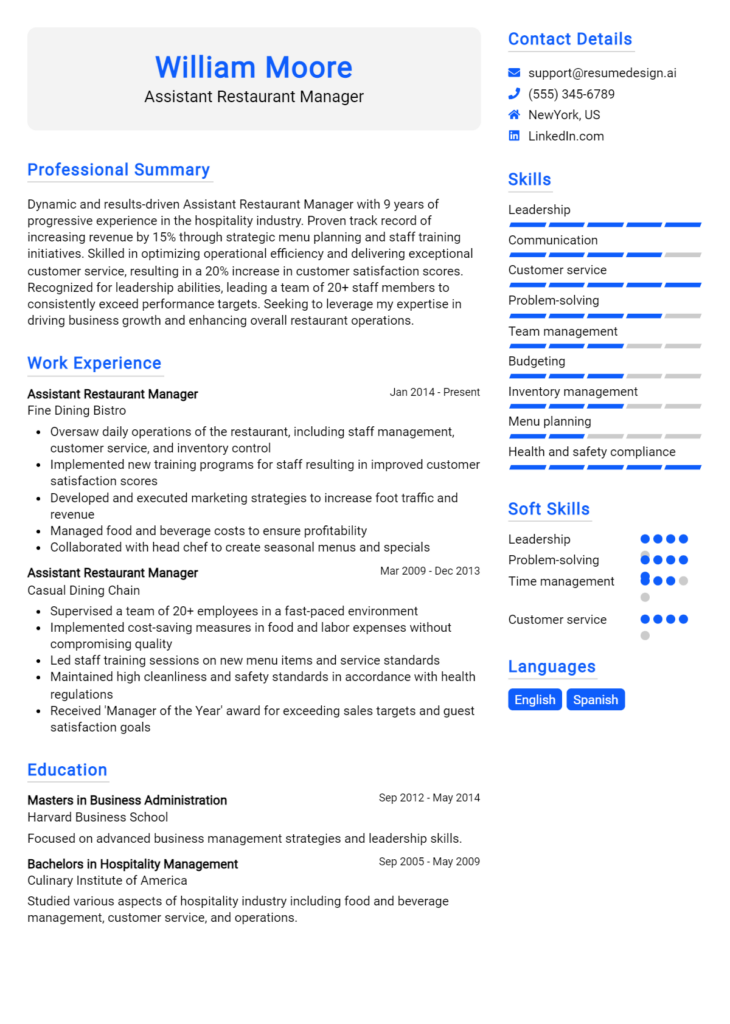Chief Operating Officer Core Responsibilities
The Chief Operating Officer (COO) plays a pivotal role in managing the organization's day-to-day operations, ensuring alignment across various departments. Key responsibilities include strategic planning, resource allocation, and performance monitoring. A successful COO possesses strong technical, operational, and problem-solving skills, which are essential in navigating complex challenges and driving organizational goals. These competencies should be highlighted in a well-structured resume to demonstrate the candidate's capability to enhance efficiency and foster collaboration across functions.
Common Responsibilities Listed on Chief Operating Officer Resume
- Developing and implementing operational strategies to achieve business objectives
- Overseeing daily operations and ensuring efficiency across departments
- Collaborating with senior executives to align departmental goals with company vision
- Monitoring performance metrics and making data-driven decisions
- Managing budgets, forecasts, and financial performance
- Identifying and mitigating operational risks
- Leading cross-functional teams to enhance productivity
- Establishing policies and procedures to improve operational effectiveness
- Fostering a culture of continuous improvement and innovation
- Building relationships with key stakeholders and partners
- Facilitating communication between departments to ensure alignment
- Evaluating and optimizing supply chain processes
High-Level Resume Tips for Chief Operating Officer Professionals
In the competitive landscape of executive leadership, a well-crafted resume serves as a critical tool for Chief Operating Officer (COO) professionals. This document often represents the first impression candidates make on potential employers, making it essential to effectively showcase not only their skills and qualifications but also their proven achievements. A resume tailored for a COO role must encapsulate the strategic vision, operational expertise, and leadership capabilities that are vital for driving organizational success. This guide will equip you with practical and actionable resume tips specifically designed for Chief Operating Officer professionals, ensuring that you stand out in a crowded field.
Top Resume Tips for Chief Operating Officer Professionals
- Tailor your resume to the job description by incorporating relevant keywords and phrases from the posting.
- Highlight your leadership experience, focusing on roles where you directly influenced operational strategy and performance.
- Quantify your achievements with specific metrics, such as cost savings, revenue growth, or efficiency improvements.
- Emphasize industry-specific skills that align with the expectations of the organization and the sector.
- Include a summary statement at the top of your resume that encapsulates your professional philosophy and key accomplishments.
- Showcase your ability to drive change and manage complex projects, detailing specific initiatives you have led.
- Incorporate testimonials or metrics that speak to your leadership style and effectiveness in team management.
- Utilize a clean, professional format that enhances readability and draws attention to key sections of your resume.
- Keep your resume concise, ideally one to two pages, while ensuring it contains all pertinent information.
By implementing these targeted tips, Chief Operating Officer candidates can significantly enhance their resumes, positioning themselves as strong contenders for executive roles. A well-structured and tailored resume can greatly increase the chances of landing interviews and ultimately securing coveted positions in the COO field, where leadership and operational excellence are paramount.
Why Resume Headlines & Titles are Important for Chief Operating Officer
In the competitive landscape of executive recruitment, a Chief Operating Officer (COO) must stand out from the crowd, and a well-crafted resume headline or title plays a crucial role in achieving this goal. A strong headline serves as a powerful introduction that can immediately capture the attention of hiring managers, summarizing a candidate's key qualifications in a single impactful phrase. It should be concise, relevant, and directly related to the job being applied for, making it easier for hiring professionals to assess a candidate's suitability for the role at a glance.
Best Practices for Crafting Resume Headlines for Chief Operating Officer
- Keep it concise: Aim for a headline that is no longer than 10 words.
- Be role-specific: Clearly indicate your target position as a COO.
- Highlight key strengths: Focus on your most relevant skills or experiences.
- Use action-oriented language: Choose strong verbs that convey impact.
- Incorporate metrics if possible: Quantify achievements to add credibility.
- Tailor for each application: Customize the headline to align with the job description.
- Showcase industry expertise: Mention specific sectors or fields you excel in.
- Avoid jargon: Use clear language that is easily understood by all readers.
Example Resume Headlines for Chief Operating Officer
Strong Resume Headlines
Results-Driven COO with 15+ Years in Operational Excellence
Transformational Leader Specializing in Growth Strategies and Efficiency
Dynamic Executive with Proven Track Record of Revenue Growth
Strategic COO with Expertise in Tech-Driven Solutions and Innovation
Weak Resume Headlines
Experienced Professional Seeking New Opportunities
Operations Executive
Hardworking Individual
The strong headlines are effective because they are specific, impactful, and encapsulate the candidate's experience and achievements in a way that resonates with hiring managers. They provide a clear picture of what the candidate brings to the table, making them memorable. In contrast, the weak headlines fail to impress due to their vagueness and lack of focus, missing the opportunity to communicate the candidate's unique qualifications and value proposition effectively.
Writing an Exceptional Chief Operating Officer Resume Summary
A well-crafted resume summary is crucial for a Chief Operating Officer (COO) as it serves as the first impression for hiring managers. In a competitive job market, a strong summary quickly captures attention by highlighting key skills, relevant experience, and notable accomplishments that align with the responsibilities of the role. It should be concise and impactful, tailored specifically to the job description, ensuring that the candidate's unique qualifications stand out from the rest. A compelling summary not only sets the tone for the rest of the resume but also encourages hiring managers to delve deeper into the candidate's achievements and capabilities.
Best Practices for Writing a Chief Operating Officer Resume Summary
- Quantify achievements: Use numbers and percentages to showcase your impact and contributions.
- Focus on skills: Highlight leadership and operational management skills that are crucial for a COO.
- Tailor the summary: Customize your summary for each job application, emphasizing relevant experiences.
- Keep it concise: Limit your summary to 3-5 sentences for clarity and brevity.
- Use impactful language: Choose strong action verbs and descriptive adjectives to convey confidence and capability.
- Highlight industry expertise: Mention specific industries or sectors where you have significant experience.
- Showcase strategic vision: Emphasize your ability to drive company growth and operational efficiency.
- Include leadership experience: Highlight your roles in managing teams and influencing company culture.
Example Chief Operating Officer Resume Summaries
Strong Resume Summaries
Dynamic Chief Operating Officer with over 15 years of experience in scaling operations for technology firms, leading to a 40% increase in revenue over three years. Proven track record in developing strategic initiatives that enhance productivity and streamline processes.
Results-oriented executive with a strong background in financial management and operational excellence. Successfully reduced operational costs by 25% while improving service delivery metrics by 30% in a high-growth environment.
Innovative COO with a comprehensive understanding of supply chain management, achieving a 50% reduction in turnaround time through process optimization. Adept at leading cross-functional teams to surpass company goals.
Weak Resume Summaries
Experienced professional looking for a COO position where I can utilize my skills.
Chief Operating Officer with some experience in operations management, seeking new opportunities to grow in the industry.
The examples of strong resume summaries are considered effective because they provide specific, quantifiable results that demonstrate the candidate's direct impact on previous organizations. They are focused, relevant, and showcase a clear alignment with the COO role. In contrast, the weak summaries lack detail and clarity, failing to convey any measurable achievements or unique qualifications, rendering them generic and unmemorable.
Work Experience Section for Chief Operating Officer Resume
The work experience section of a Chief Operating Officer (COO) resume is critical in demonstrating the candidate's qualifications and suitability for the role. This section provides a comprehensive overview of the candidate's technical skills, leadership capabilities, and track record of delivering high-quality products and services. By effectively quantifying achievements and aligning past experiences with industry standards, candidates can illustrate their ability to drive operational excellence and strategic growth within an organization. This clarity not only highlights the candidate's expertise but also reassures potential employers of their capacity to manage complex teams and achieve significant business outcomes.
Best Practices for Chief Operating Officer Work Experience
- Highlight technical skills relevant to operations management, such as data analysis, process optimization, and project management.
- Quantify achievements with specific metrics, like cost savings, revenue growth, or efficiency improvements.
- Focus on collaborative efforts, showcasing experience in leading cross-functional teams and fostering a culture of teamwork.
- Use action verbs to convey leadership and initiative, such as "spearheaded," "implemented," or "streamlined."
- Align experiences with industry benchmarks to underscore competitiveness and relevance.
- Include challenges faced and how they were overcome to demonstrate problem-solving skills.
- Prioritize recent and relevant roles that illustrate a clear progression of responsibilities.
- Tailor the content to the specific job description to ensure alignment with the employer’s needs.
Example Work Experiences for Chief Operating Officer
Strong Experiences
- Directed a comprehensive operational overhaul that resulted in a 30% reduction in operational costs while increasing production efficiency by 25% over two years.
- Implemented a data-driven decision-making framework that enhanced forecasting accuracy by 40%, leading to improved inventory management and reduced waste.
- Led a cross-departmental initiative that improved customer satisfaction scores from 75% to 90% within one fiscal year through process standardization and enhanced training programs.
- Managed a team of 150 employees, fostering a culture of open communication and collaboration, which decreased turnover rates by 15% in a challenging labor market.
Weak Experiences
- Responsible for overseeing daily operations and ensuring everything ran smoothly.
- Worked on various projects to improve processes without specifying outcomes or metrics.
- Collaborated with team members and contributed to meetings regularly.
- Assisted in implementing new procedures and policies as needed.
The examples listed above are considered strong because they include specific, quantifiable outcomes that demonstrate the candidate's ability to lead effectively and make significant improvements within the organization. They illustrate clear achievements linked to measurable results, showcasing the candidate's value. Conversely, the weak experiences lack detail and fail to provide any tangible results or specific contributions, making it difficult for potential employers to gauge the candidate's impact or effectiveness in previous roles.
Education and Certifications Section for Chief Operating Officer Resume
The education and certifications section of a Chief Operating Officer (COO) resume is crucial for establishing the candidate's foundation in business management and operational excellence. This section not only showcases the academic background of the candidate but also demonstrates their commitment to continuous learning through industry-relevant certifications and specialized training. By including relevant coursework and credentials, candidates can significantly enhance their credibility and align their qualifications with the specific demands of the COO role, illustrating their preparedness to drive organizational success.
Best Practices for Chief Operating Officer Education and Certifications
- Focus on relevant degrees such as an MBA or a master's in a related field.
- List industry-recognized certifications like Six Sigma, PMP, or Lean Management.
- Include any specialized training that aligns with operational leadership roles.
- Provide details on relevant coursework that directly applies to strategic management and operations.
- Highlight continuous education efforts, such as workshops or professional development programs.
- Use clear and concise formatting to ensure easy readability and quick reference.
- Emphasize any honors or distinctions received during your academic career.
- Maintain a focus on qualifications that are recent and pertinent to current industry standards.
Example Education and Certifications for Chief Operating Officer
Strong Examples
- MBA in Operations Management from Harvard Business School.
- Certified Six Sigma Black Belt from the American Society for Quality.
- Certificate in Strategic Leadership from Stanford University.
- Relevant coursework: Advanced Project Management, Organizational Behavior, and Supply Chain Optimization.
Weak Examples
- Bachelor's degree in English Literature from a non-accredited institution.
- Certification in Basic Computer Skills from a local community center.
- Outdated certification in Quality Control from the 1990s.
- High school diploma with no further education or training.
The strong examples listed reflect qualifications that are not only relevant but also prestigious and current, showcasing the candidate's readiness for a high-level operational role. In contrast, the weak examples highlight qualifications that lack relevance to the COO position, are outdated, or demonstrate a lack of advanced education and training, thereby diminishing the candidate's appeal to potential employers.
Top Skills & Keywords for Chief Operating Officer Resume
The role of a Chief Operating Officer (COO) is pivotal in steering an organization towards its strategic goals. A well-crafted resume that highlights the right skills can significantly enhance a candidate's chances of standing out in a competitive job market. Skills not only showcase a candidate's qualifications but also reflect their ability to lead, manage, and optimize operations effectively. For COOs, both hard and soft skills are essential; they must possess technical expertise while also demonstrating exceptional leadership and interpersonal abilities. By focusing on these skills in your resume, you can effectively convey your value to potential employers and secure a position that aligns with your career aspirations.
Top Hard & Soft Skills for Chief Operating Officer
Soft Skills
- Leadership
- Strategic Thinking
- Communication
- Problem-Solving
- Negotiation
- Time Management
- Adaptability
- Team Building
- Conflict Resolution
- Decision-Making
- Emotional Intelligence
- Interpersonal Skills
- Collaboration
- Change Management
- Visionary Thinking
Hard Skills
- Financial Management
- Project Management
- Operations Management
- Data Analysis
- Supply Chain Management
- Regulatory Compliance
- Performance Metrics
- Business Development
- Risk Management
- Process Improvement
- Budgeting
- Technology Proficiency
- Market Analysis
- Quality Assurance
- Resource Allocation
- Strategic Planning
For more insights on essential skills and how to effectively present your work experience, consider tailoring your resume to reflect these competencies, ensuring that you capture the attention of hiring managers in your pursuit of a COO position.
Stand Out with a Winning Chief Operating Officer Cover Letter
Dear [Hiring Manager's Name],
I am writing to express my interest in the Chief Operating Officer position at [Company Name], as advertised on [where you found the job listing]. With over [X years] of experience in operational leadership and a proven track record of driving organizational efficiency, I am excited about the opportunity to contribute to your team. My background in [specific industry or sector], combined with my passion for optimizing processes and leading high-performing teams, aligns perfectly with the goals of [Company Name].
In my previous role as COO at [Previous Company Name], I successfully led initiatives that increased operational efficiency by [specific percentage or metric], resulting in significant cost savings and improved service delivery. I implemented strategic frameworks that streamlined workflows, enhanced cross-departmental collaboration, and fostered a culture of continuous improvement. My hands-on experience in managing complex projects and driving change has equipped me with the skills necessary to navigate the challenges that come with a leadership position in a dynamic environment like [Company Name].
I am particularly drawn to [Company Name] because of [specific reason related to the company, such as its mission, values, or recent achievements]. I believe my strategic mindset and ability to leverage data-driven insights can help propel [Company Name] toward its operational objectives while ensuring that all practices align with the overarching vision. I am eager to bring my expertise in scaling operations and enhancing productivity to your esteemed organization.
Thank you for considering my application. I look forward to the opportunity to discuss how my experience and vision can contribute to the continued success of [Company Name]. Please feel free to contact me at [your phone number] or [your email] to arrange a conversation.
Sincerely,
[Your Name]
[LinkedIn Profile or Other Contact Information]
Common Mistakes to Avoid in a Chief Operating Officer Resume
When crafting a resume for the role of Chief Operating Officer (COO), it is essential to present a clear and compelling narrative that showcases leadership abilities, operational expertise, and strategic vision. However, many candidates fall into common pitfalls that can diminish the impact of their resume. Understanding these mistakes can help you create a more effective document that positions you as a strong contender for the role.
Vague Job Descriptions: Failing to provide specific examples of past responsibilities can make it difficult for hiring managers to assess your qualifications. Use quantifiable achievements to illustrate your impact.
Lack of Tailoring: Submitting a generic resume that doesn’t align with the specific job description can signal a lack of interest or attention to detail. Customize your resume to highlight relevant experience and skills.
Ignoring Soft Skills: While technical skills are vital, neglecting to mention leadership, communication, and interpersonal skills can leave a gap in your profile. Highlight how you’ve effectively led teams and communicated with stakeholders.
Overemphasis on Past Titles: Focusing too much on job titles rather than the actual accomplishments and responsibilities associated with those roles can undermine your achievements. Emphasize what you did in each position instead.
Excessive Length: A resume that is too lengthy can overwhelm hiring managers. Aim for a concise document that covers your most relevant experiences and skills in 1-2 pages.
Neglecting Modern Formatting: Using outdated formats or overly complex designs can detract from the content of your resume. Opt for a clean, professional layout that enhances readability.
Omitting Key Metrics: Failing to include metrics or KPIs that demonstrate your success can make your accomplishments seem less significant. Use numbers to quantify your impact, such as revenue growth or cost reductions.
Poor Proofreading: Spelling and grammatical errors can create a negative impression and suggest a lack of professionalism. Always proofread your resume carefully or consider having someone else review it for errors.
Conclusion
As we have explored the critical role of a Chief Operating Officer (COO), it's clear that this position demands a unique blend of leadership, strategic vision, and operational expertise. The COO is pivotal in driving efficiency, fostering innovation, and ensuring that the company's goals are met through effective management of resources and processes. A successful COO not only oversees day-to-day operations but also plays a significant role in shaping the organization’s future direction.
To excel in this role, it is essential to highlight relevant skills and experiences on your resume that resonate with these responsibilities. If you're looking to improve your COO resume or create one from scratch, now is the perfect time to take action. Review your resume to ensure it reflects your accomplishments and capabilities effectively.
Consider utilizing available resources to enhance your job application materials. You can explore a variety of resume templates that cater to executive roles, use a resume builder for a user-friendly experience in crafting your resume, and check out resume examples to gain inspiration from successful COO resumes. Additionally, don’t forget to create a compelling cover letter using cover letter templates that align with your professional narrative.
Take the next step in your career by ensuring your resume stands out in the competitive job market. Start reviewing and refining your materials today!

